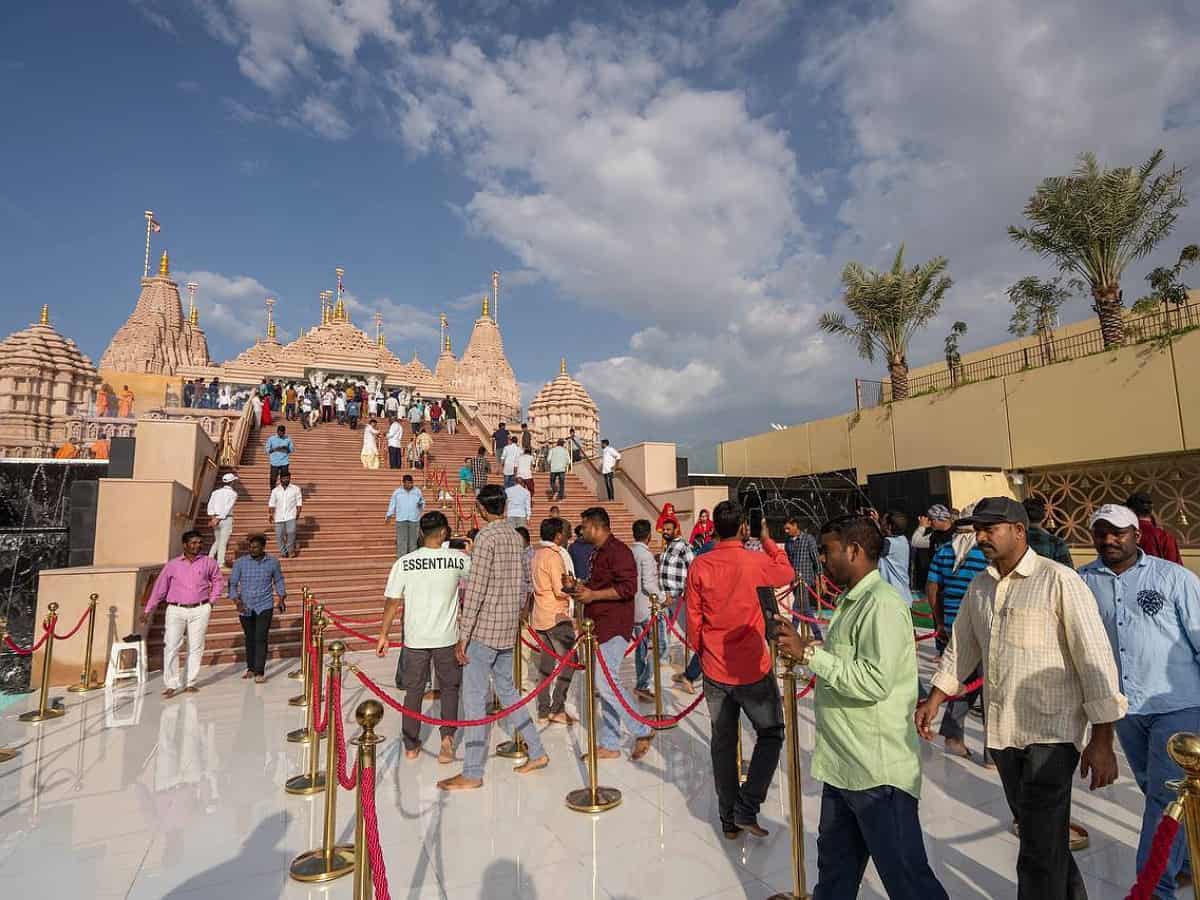
Abu Dhabi: Over 3.5 lakh devotees visited the first stone Hindu temple in Abu Dhabi within a month of its opening for the public, according to temple authorities.
The iconic temple which was inaugurated in February by Prime Minister Narendra Modi was opened for visitors on March 1.
“In the first month, there were approximately 350,000 devotees and visitors, 50,000 of whom visited each weekend (Saturday–Sunday). It’s important to note that on Mondays the Mandir conducts private prayers and is closed to visitors, meaning the complex was accessible for only 27 out of the 31 days in March,” a temple spokesperson told PTI.
“Every evening from Tuesday to Sunday, Ganga aarti is performed at 7.30 pm on the banks of the Swaminarayan ghat, which has been created using holy water from Ganga and Yamuna transported from India,” he added.
The grand temple was inaugurated during a dedication ceremony attended by over 5,000 invitees on February 14.
The temple has been built by the BAPS Swaminarayan Sanstha on a 27-acre site in Abu Mureikhah, near Al Rahba off the Dubai-Abu Dhabi Sheikh Zayed Highway, at a cost of around Rs 700 crore.
Constructed with 18 lakh bricks and 1.8 lakh cubic metres of sandstone sourced directly from Rajasthan Abu Dhabi’s first Hindu temple has been made in the Nagara style of architecture, just like the Ram Temple in Ayodhya which was inaugurated earlier this year.
The BAPS Hindu Mandir is the largest in all of the Gulf region. The UAE has three other Hindu temples in Dubai.
“Since the temple is little on the outskirts and in the middle of a desert, public bus service from the city has been started for weekends to allow visitors to easily come to the temple,” the spokesperson said.
During Prime Minister Modi’s two-day visit to the Gulf nation in 2015, the UAE allocated land for constructing a temple in Abu Dhabi. This visit held significant diplomatic importance, as Modi became the first Indian Prime Minister since Indira Gandhi to visit this strategically vital Gulf nation in 34 years.
The construction of the temple began in 2019. The UAE has at least 3.5 million Indians who are part of the Indian workforce in the Gulf. The land for the temple was donated by the UAE government.
Seven spires representing seven emirates of the UAE, carvings of camels, and national bird falcon, are part of the architecture of the first Hindu stone temple in Abu Dhabi, to give equal representation to the host country.
To give equal representation to the host country, along with animals that occupy an important place in Indian mythology like elephants, camels and lions, the UAE’s national bird, the falcon, has also been included in the design.
Apart from 15 tales from India, including the Ramayana and Mahabharata, stories from Mayan, Aztec, Egyptian, Arabic, European, Chinese and African civilizations have also been depicted in the temple.
While the outer walls of the temple are made using sandstone from India, the interior, made of white Italian marble, is adorned with intricately designed and carved columns and walls.
Other Noteworthy architectural elements include two ghumats (domes), 12 samrans (dome-like structures) and 402 pillars. The two ghumats are the “Dome of Peace” and “Dome of Harmony”.
Over 300 high-tech sensors to measure temperature and monitor seismic activity, fly ash in the foundation to reduce carbon footprint, 18 million bricks, nano heat resistant tiles and no usage of iron and steel—the temple has been built using ancient architectural methods clubbed with scientific techniques.
The temple’s facade features exquisite marble carvings set against a sandstone backdrop, crafted from more than 25,000 pieces of stone by skilled artisans from Rajasthan and Gujarat. A substantial number of pink sandstone were transported from northern Rajasthan to Abu Dhabi for the temple.



